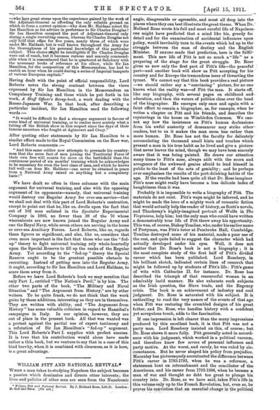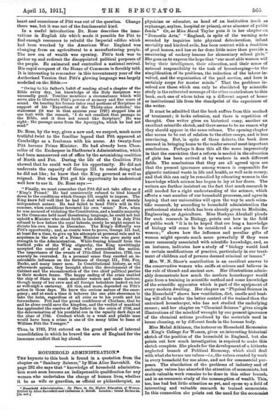WILLIAM PITT AND NATIONAL REVIVAL.* WHEN a man takes to
studying Napoleon the subject becomes a passion which dominates and directs other interests ; the lives and policies of other men are seen from the Napoleonic • William Pitt and Notional Revival. By J. Holland How, Litt.D. London 0. Bell and Sono. Lies net.]
angle, disagreeable or agreeable, and must all drop into the places where they can best illustrate the great theme. When Dr Holland Rose wrote his full and most careful life of Napoleon . one might have predicted that a mind like his, greedy for detail and for the examination of accidental influences upon policy, would inevitably turn to the events which led up to the struggle between the man of destiny and the English Minister. If anyone made that prediction, here is the fulfil- ment. This new life of Pitt is not so much a " life " as a preparing of the stage for the great struggle. Dr. Rose gives us now only the first part of Pitt's life—the peaceful part—and another book will show us Pitt accepting for his country and for Europe the tremendous issue of thwarting the tyrant. We cannot say that this book provides a real picture —we should rather say a " convincing " picture, for no one knows what the reality was—of Pitt the man. It starts off, like any biography, with several pages on childhood and education, and then the waters of politics close over the head of the biographer. He emerges only once and again with a' faint effort to remain a biographer, as, for example, when he writes a chapter on Pitt and his friends, and describes the roysterings in the house on Wimbledon Common. We can- not say how the insistence on Pitt's human declensions from his awful austerity of demeanour may strike other readers, but to us it makes the man seem less rather than more human. Dr. Rose has not the faculty for delicately accumulating the thousand small hints and touches which present a man in his true habit as be lived and give a picture that never leaves the mind, though we may have been scarcely aware that it was being painted. He draws our attention many times to Pitt's nose, always atilt with the scorn and arrogance of the awkward genius afraid to lend himself in public to the least of the arts of geniality ; and be perhaps over-emphasises the results of the port-drinking habits of the age. If the results had been quite all that Dr. Rose imagines Pitt's nose might really have become a less delicate index of haughtiness than it was.
Probably it is impossible to write a biography of Pitt. The materials do not exist. Pitt's ways might be inferred, and he might be made the hero of a mighty work of romantic fiction that would actually help the reader of history, as Scott's novels, and Thackeray's highly-imagined portrait of Wolfe in The Virginians, help him; but the only man who could have written a demonstrably true life of Pitt threw away his opportunity. This was, of course, Bishop Tomline, who, under his earlier name of Pretyman, was Pitt's tutor at Pembroke Hall, Cambridge. Tomline destroyed some of his material, made a poor use of the rest, and quite failed to suggest the character which had actually developed under his eyes. Well, it does not matter that Dr. Rose's book is not a biography ; it is the most complete study of the first half of Pitt's divided career which has been published. Lord Rosebery, in his brilliant sketch, indicated certain lines of research that might be followed up by students of Pitt's life : Pitt's game of wits with Catharine IL for instance. Dr. Rose has described the triumph of that resourceful woman in an admirably lucid manner. He also exhausts such subjects as the Irish question, the Slave trade, and the Regency crisis. The book is an achievement of industry and cool judgment. Dr. Rose is saturated with his subject. It is. enthralling to read the very names of the events of that age when Pitt was restoring the crumbled designs of his great father, and Dr. Rose, who handles history with a confident. yet scrupulous touch, adds to the fascination.
If one impression is left clearer than the many impressions produced by this excellent book, it is that Pitt was not a party man. Lord Rosebery insisted on this, of course ; but Dr. Rose shows it more fully. Pitt generally acted in accord- ance with his judgment, which worked in a political vacuum, and therefore knew few errors of personal influence and party motive. At the worst, and rarely, he was ruled by cir- cumstances. But he never shaped his policy from prejudice. Macaulay has picturesquely accentuated the difference between Pitt's career in 1783-1793,, when he was a reformer, a statesman bent on retrenchment and the conciliator of the Amerimns, and his career from 1793-1806, when be became a man of war, and thought no debt too great to plunge his country into. Dr. Rose, as we have said, takes Pitt's life in this volume only up to the French. Revolution, but, even so, he proves his conviction that an essential change in the political
heart and conscience of Pitt was out of the question. Change there was, but it was not of the fundamental kind.
In a useful introduction Dr. Rose describes the inno- vations in English life which made it possible for Pitt to find enough resources to rebuild the Imperial edifice which had been wrecked by the American War. England was changing from an agricultural to a manufacturing people.
The new era of wealth was opening. Pitt's task was to gather up and redirect the disappointed political purposes of the people. He animated and controlled a national revival. His rapid conquest of the House of Commons is forcibly told. It is interesting to remember in this tercentenary year of the Authorised Version that Pitt's glowing language was largely modelled on the Bible
"Owing to his father's habit of reading aloud a chapter of the Eible every day, his knowledge of the Holy Scripture was unusually good. Towline mentions a circumstance which will serve also to illustrate Pitt's powers of memory and fine sense of sound. On hearing his former tutor read portions of Scripture in support of his Exposition of the Thirty-nine Articles,' the statesman (it was in that anxious year 1797) stopped him at one text with the remark, I do not recollect that passage in the Bible, and it does not sound like Scripture. He was right : the passage came from the Apocrypha, which he had not read."
Dr. Rose, by the way, gives a new and, we suspect, much more truthful twist to the familiar legend that Pitt appeared at Cambridge as a freshman with his nurse. At twenty-four Pitt became Prime Minister. He had already been Chan- cellor of the Exchequer in Shelburne's Administration, which had been manceuvred out of office by the astonishing coalition of North and Fox. During the life of the Coalition Pitt showed that he could wait for his opportunity. He did not underrate the capacity of George HI. to resist doing what he did not like ; he knew that the King governed as well as reigned. But when Pitt got his opportunity he understood well how to use it. Dr. Rose says :-
"Finally, we must remember that Pitt did not take office as a ' King's Friend.' He had consistently refused to bind himself down to the conditions which George III. sought to impose. The King knew full well that he had to deal with a man of sternly independent nature. He had failed to bend Pitt's will in the summer, when conditions favoured his own cause.' Now, when he was accused of violating the Constitution, and a hostile majority in the Commons held most threatening language, he could not but uphold a Minister who stood forth in his defence. If in July Pitt refused to bow before the royal behests, surely he might expect to dictate his own terms in December. The King's difficulty was Pitt's opportunity; and, as events were to prove, George III. had, at least for a time, to give up his attempts at personal rule and to acquiesce in the rule of a Prime Minister who gave unity and strength to the Administration. While freeing himself from the loathed yoke of the Whig oligarchy, the King unwittingly accepted the control of a man who personified the nation. The importance of the events of 17th-22nd December, 1783, can scarcely be overrated. In a personal sense they exerted an in- calculable influence on the fortunes of George III., Pitt, Fox, Burke, and many lesser men. In Constitutional history, as will afterwards appear, they brought about the development of the Cabinet and the reconstruction of the two chief political parties in their modern forms. The happy ending of the crisis enabled the ship of State to reach smoother waters and make harbour, though many of her crew and all foreign beholders looked on her as well-nigh a castaway. All this, and more, depended on Pitt's action in those days. He knew the serious nature of the emer- gency; and at such a time it behoves the one able steersman to take the helm, regardless of all cries as to his youth and his forwardness. Pitt had the proud confidence of Chatham, that he and he alone could save the kingdom, and the verdict of mankind has applauded the resolve of the father in the crisis of 1756, and the determination of his youthful son in the equally dark days at the close of 1783. Conduct which in a weak and pliable man would have been a crime is one of the many titles to fame of William Pitt the Younger."
Thus, in 1783, Pitt entered on the great period of internal consolidation in which he braced the arm of England for the immense conflict that lay ahead.





































 Previous page
Previous page